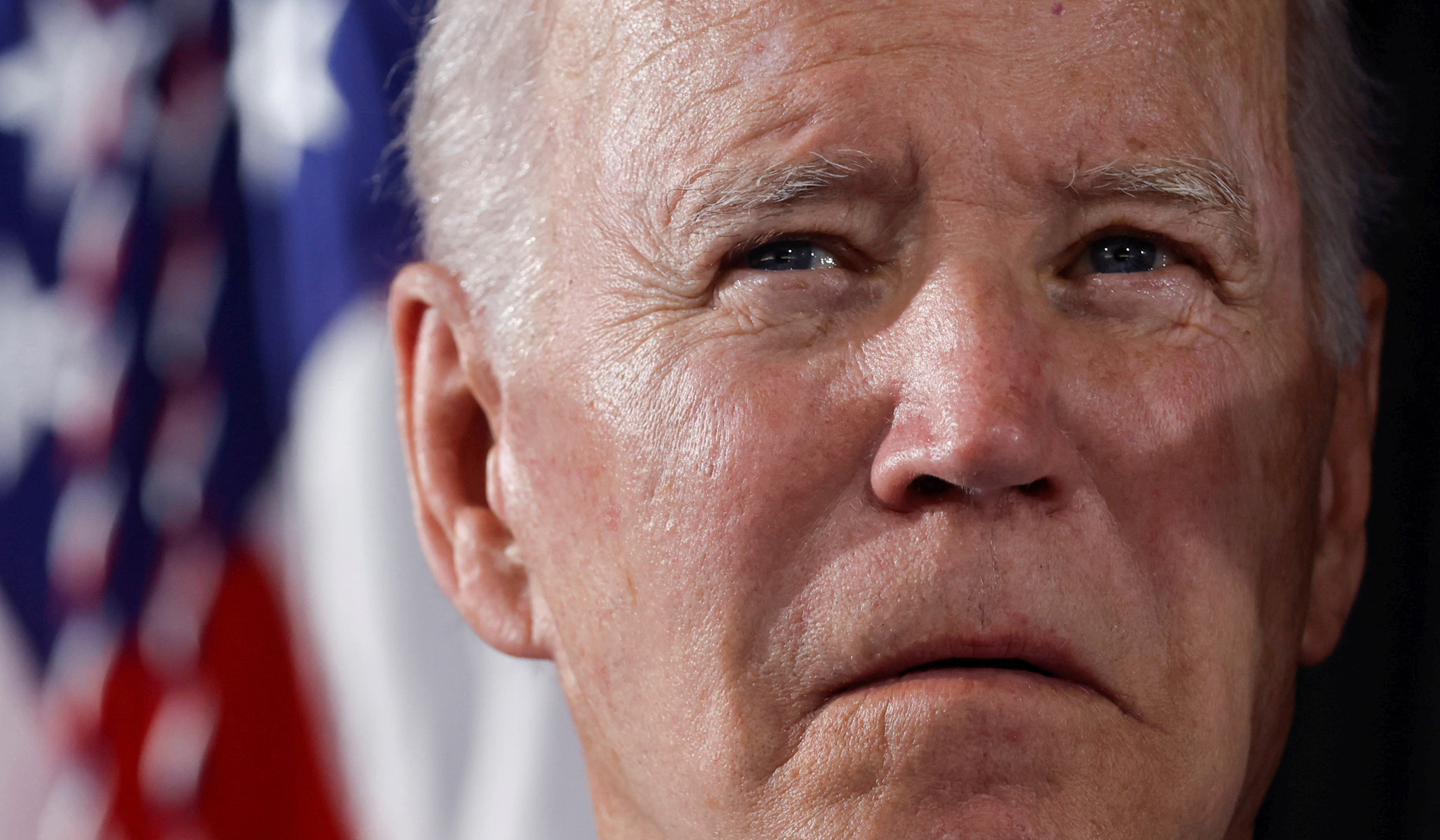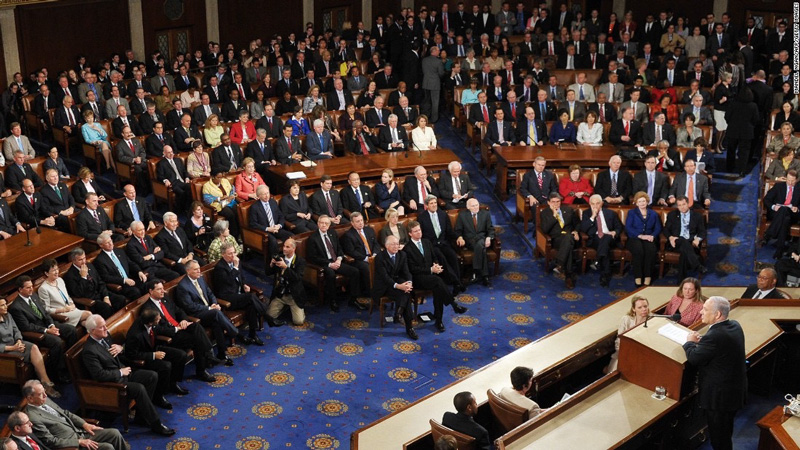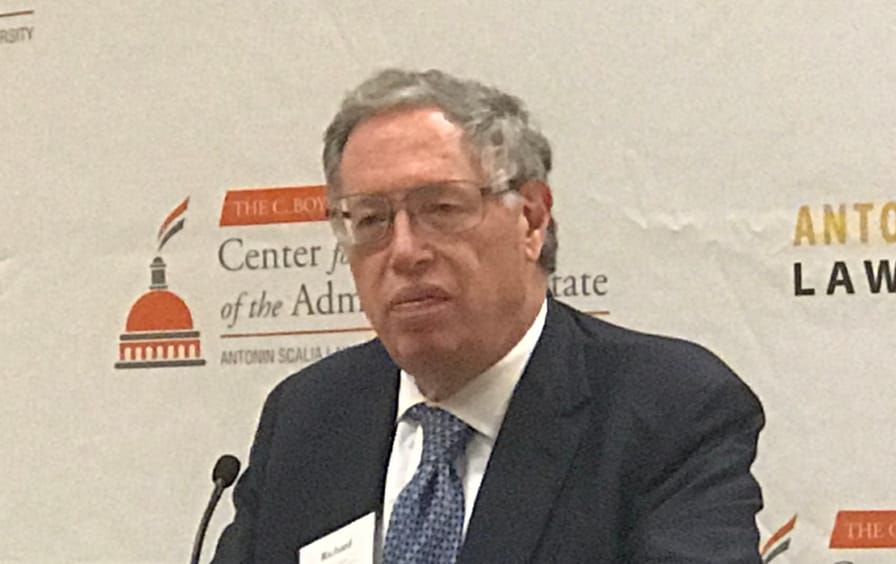Netanyahu Rejects Biden’s Call to ‘Walk Away’ From Judicial Reform
American legal expert calls out Biden admin’s hypocrisy over pressure on Netanyahu, while it leans so heavily on executive orders.
 President Biden denies meddling in domestic Israeli affairs, telling reporters,
“They know my position. They know America’s position. They know the
American Jewish position.”
President Biden denies meddling in domestic Israeli affairs, telling reporters,
“They know my position. They know America’s position. They know the
American Jewish position.”
Israeli Prime Minister Benjamin Netanyahu on Tuesday rebuffed US President Joe Biden’s call earlier in the day to “walk away” from his government’s judicial reform push.
“Israel is a sovereign country which makes its decisions by the will of its people and not based on pressures from abroad, including from the best of friends,” said Netanyahu.
Speaking to reporters before boarding Air Force One at Raleigh-Durham International Airport in North Carolina, Biden said that “like many strong supporters of Israel, I am very concerned [by the judicial reform plan]. I am concerned that they get this straight. They cannot continue down this road. I have sort of made that clear,” adding, “I hope he walks away from it.”
Biden denied meddling in domestic Israeli affairs, telling reporters, “They know my position. They know America’s position. They know the American Jewish position.”
The US president also shot down reports that Netanyahu would soon be invited to the White House.
On Monday, following Netanyahu’s announcement of a temporary halt to the judicial reform legislation, US Ambassador to Israel Thomas Nides hinted that the Israeli premier would soon receive his first White House invitation since retaking office for the sixth time in late December.
However, in response to a reporter’s question about whether such an invitation would be extended, Biden replied, “No. Not in the near term.”
Olivia Dalton, White House principal deputy press secretary, told reporters earlier en route to North Carolina that there was no plan for Netanyahu to visit the White House.
“Israeli leaders have a long history, tradition of visiting Washington, and Prime Minister Netanyahu will likely take a visit at some point. But there’s nothing currently planned,” said Dalton, according to the White House.
 In 2015, Netanyahu addressed the joint session of the US Congress. Since Biden does not want to invite the Israeli Prime minister to the White House, Congress should invite him to explain why Israel needs judicial reform
In 2015, Netanyahu addressed the joint session of the US Congress. Since Biden does not want to invite the Israeli Prime minister to the White House, Congress should invite him to explain why Israel needs judicial reform
In response to another question, the White House spokeswoman said, “We welcomed the decision to delay the implementation of the judicial reform plan. We thought that gives important space and time for compromise and dialogue. And as we’ve said all along, we believe that’s incredibly important.”
In a series of Twitter posts in response to Biden’s comments, Netanyahu emphasized the historically strong relations between the two countries that are continuing with the current administration.
“I have known President Biden for over 40 years, and I appreciate his longstanding commitment to Israel. The alliance between Israel and the United States is unbreakable and always overcomes the occasional disagreements between us,” said Netanyahu.
“My administration is committed to strengthening democracy by restoring the proper balance between the three branches of government, which we are striving to achieve via a broad consensus.”
On Tuesday evening, Israeli coalition and opposition representatives met for the first time to discuss the judicial reform plan, at the Jerusalem residence of Israeli President Isaac Herzog.
A statement from Herzog’s office indicated that there was a “positive atmosphere” for the talks, that were scheduled to continue on Wednesday.
Expert calls out Biden hypocrisy
Legal experts note that Israel’s high court is in need of urgent reform, but how best to fix it is difficult to say. And statements from the US administration muddy the waters.
“The contradictions between people’s characterizations of Israel’s reforms and parallel debates in the United States are glaring,” Adam White, a senior fellow at the American Enterprise Institute who studies the Supreme Court, told JNS.
During the daily press briefing on March 27, Vedant Patel, the US State Department’s principal deputy spokesperson, responded to a question about Israel, “Democratic societies are strengthened by checks and balances, and fundamental changes to a democratic system should be pursued with the broadest base of popular support.” In response to a different question, he added the word “possible”: “Fundamental changes to a democratic system should be pursued with the broadest possible base of support.”
Mere minutes before White House press secretary Karine Jean-Pierre used the same language during the press briefing, although she used the second quote—with the word “possible”—in response to two questions. Adrienne Watson, spokeswoman for the National Security Council, said the same words in a March 26 statement.
 Richard Epstein, professor of law and director of the Classical Liberal Institute at NYU Law.
Richard Epstein, professor of law and director of the Classical Liberal Institute at NYU Law.
That the Biden administration is preaching to Israel the importance of legislating by broad consensus is the height of hypocrisy, Richard Epstein, professor of law and director of the Classical Liberal Institute at NYU Law, told JNS.
“[Biden] is a complete autocrat,” said Epstein, who also holds a senior fellowship at the Hoover Institution and a distinguished emeritus law professorship at the University of Chicago. He called executive orders “a Biden specialty.”
Epstein just sued Biden unsuccessfully for what he described as the president’s unilateral firing of advisory committee members, whom presidents appoint but whose jobs have been secure despite administration transitions in the past.
“This has never happened with respect to these advisory committees,” he said. “Nobody turns in a letter of resignation. Nobody fires them. And Trump puts his people in there, and so the Biden guys come in and fire them all.” (Epstein famously called for former President Donald Trump to resign on his first day in office.)
“The first and only time in which it has been done,” said Epstein, noting that Biden has often turned to executive orders rather than broad consensus—the very thing his administration is calling on Israel to pursue or risk harming its democracy.
“What Biden does when he wants to stop the pipeline—executive order. He wants to forgive $500 billion worth of student loans—executive order. He wants to make sure that when government grants go out they go to a union-type situation, you add conditions to them,” said Epstein. “The most unilateral guy on the face of the globe talking about everybody else not respecting democracy. He is a complete menace.”
“Trump used to bawl and scream about that stuff, but never once did he fire somebody from a term appointment in order to put his people into place,” added Epstein. “You get this sort of pious talk coming out of these characters, but they are as anti-democratic as you could possibly imagine with respect to the way in which they do this business.”
The Biden administration and the president, he continued, “essentially treat two things—the executive orders and regulations on admitted statutes as ways to modify legislation without going through legislation. That’s what they think.”
That’s not what executive orders are supposed to do, he explained. “They are supposed to essentially do bookkeeping. Here is a program, and you are supposed to file papers. We’re going to give an executive order to tell you where you file these papers and how many copies you have to put out. Things like that.”
No comments:
Post a Comment